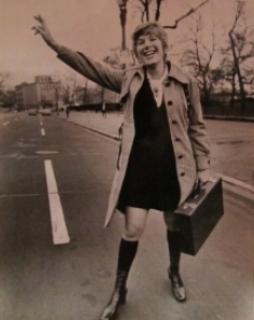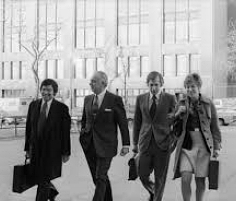From ‘60s Civil Rights Activist To Today’s Boardrooms, Sheila Talton Champions Diversity To Power Progress
/memories clear, if photos faded
So here’s the famous story. Sheila Talton hired my public relations firm back in the early ’90s to represent her technology company. One day, she took me to lunch at Chicago’s famed University Club. There, in the glow of the glorious two-story, stained-glass windows gracing the sumptuous corporate dining room, a shared history was revealed.
It turns out we’d both been at the same school (Northern Illinois University), at the same time, and in the same massive student protest—she in one faction as a civil rights protestor yelling “Black Power,” and me in the other as a member of the Student Mobilization Committee to End the War in Vietnam, shouting “Bring the Troops Home Now.” I’m sure you recognize the era.
We cracked up, sitting there in our big-shouldered, power outfits, thinking about what the gray-suited, male Masters of the Universe around us would think if they knew about our past. Undaunted, Sheila proudly claimed our ground: “Former radicals make great entrepreneurs.” And so began a professional, soon personal relationship that has endured to this day.
Given the times, we worked initially to credential Sheila as a business leader who happened to be a woman, and an African-American. Today, it’s apparent that an important reason she’s such an accomplished leader is that she is an African-American woman, and the louder she touts that, the more she empowers change in the world, by reflecting it.
Maneuvering the Labyrinth to Success
Sheila was always amazingly strategic about how she built her career—as a minority “two-fer,” she knew she had to be. She went for the gaps where she felt there would be opportunity, focusing on business in college because that’s where women were underrepresented. With her degree in hand she set her sights on the booming technology industry, knowing that in such a new, uncharted field there would be a shortage of talent and therefore more options for African-Americans.
She parlayed that strategy to watch for where the action moved in the marketplace, from hardware to software to services, and from traditional to emerging markets. As a result, after running her own company for ten years, she jumped to leadership positions at Ernst & Young, EDS and Cisco, where she gained global experience and developed a reputation as an early and generous networker, as interested in helping others as benefitting from their counsel. As she rose, however, she ran into more than a few glass ceilings as well as closed diversity doors that she could see would box her in.
Undeterred and unwilling to tread water until times changed, she returned to the entrepreneurial world where, like so many women and minorities, she could create her own destiny. She is now on her third start-up, Gray Matter Analytics, which has roared to success based both on realizing yet another market advance—that data would be driving the world—and a huge network of connections eager to help her succeed.
But this is only part of the story.
Building a Career with a Conscience
Sheila has always had a strong sense of personal responsibility. “If you’re fortunate enough to be in a position of power, use it to help others who aren’t.” She learned this early.
We cleaned up well for our corporate careers
Though she’s now regularly cited in lists of business leaders, she knows how easily she could have become a different kind of statistic. And, how important it is as a role model to share her personal story of rising from poverty, getting the opportunity to go to college and then blowing it—flunking out of her freshman year (protests and partying), a not un-familiar path for minorities. She knows she was fortunate that as she languished in a nowhere job in the secretarial pool at Allis-Chalmers, a “white guy” sales representative saw her potential, encouraged her to apply for junior college, take the hardest courses and get back into Northern. That “white guy’s” name, by the way, was Greg Stewart. One of Sheila’s 2018 New Year’s resolutions is to find him…and thank him…for what he did to change her life.
She did not waste this second chance and has since dedicated herself to offering the same helping hand to others, whether through her involvement with The Chicago Lighthouse for the Blind, or her many contributions to help those in the poverty-stricken areas of Chicago’s Lawndale neighborhood. She’s ratcheted up those efforts, as her resources and influence increased, into more social and political involvement, such as serving on the Board of the Chicago Urban League and as a bundler for Barack Obama’s elections.
With Achievement Comes the Power for Change
At the time of the last election Sheila’s career was going great, but her conscience and comfort in where the country was heading were not. As progressive policies that fostered openness and acceptance of diversity were overturned or threatened, and the discourse grew in rage and volume as it descended in tolerance, her latent activist stirred.
Her new path has two prongs. First, to use her position to continue to ensure that the strides made in diversity over the past years continue to advance. Her own companies have always reflected how she feels the world needs to look: a United Nations, with men and women of varied races, preferences and ages, with growth opportunities awarded to expertise and elbow grease, period.
She’s also built an extensive parallel career serving on major corporate boards—from Sysco Foods, to John Deere, OGE Energy and Wintrust—benefitting from the heightened interest in gender and racial representation, those very factors that were hurdles early on, to have influence at the highest levels of the business world. Her message is that growth is contingent upon expanding into areas where we aren’t in the majority and we need to become part of, not impose on, other cultures. At the same time, to fuel that growth, the workforce needs to expand to include everyone, and we need to be creative and relentless in bringing in those not yet adequately educated or trained.
It's not all work
The second prong was inspired by her one-and-a-half-year-old grandson, Jayden. One day he picked up his father’s briefcase and declared that he was going to work. This adorable story was a revelation to Sheila. Minority children, particularly boys and young men, need role models of parents who work regularly to provide a vision to their offspring of what that “looks like” and how their lives could be as a result. To make a difference in a Black Lives world, she’s now dedicated herself to taking half of what she earns from her current entrepreneurial endeavor to fund partnerships to provide role models, training and jobs for young African-American and other minority males. It’s a huge undertaking. Details to come.
Sheila is one of the few of my contemporaries who isn’t interested in changing course at this time in her life (she loves what she does), but is interested in using what she’s learned to deepen her impact. She reminds me of what author Walter Mosley says about responsibility. Don’t try to take on everything that’s wrong in the world. Pick something and focus.
Sheila’s made her pick—to doggedly foster diversity in our global world and dig in to help a hugely important demographic take a step up the ladder toward a more equal life.
I’d say Sheila is not Re-Radicalized, because she’s remained radicalized. Her continuing activist spirit even inspired the name of the main character in my upcoming novel. Judy Talton shares some of Sheila’s traits. When I asked Sheila if she minded my borrowing her last name she said, “of course, whatever you need.”
I said she was generous.









